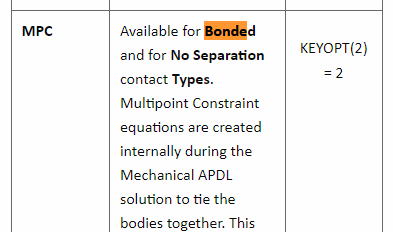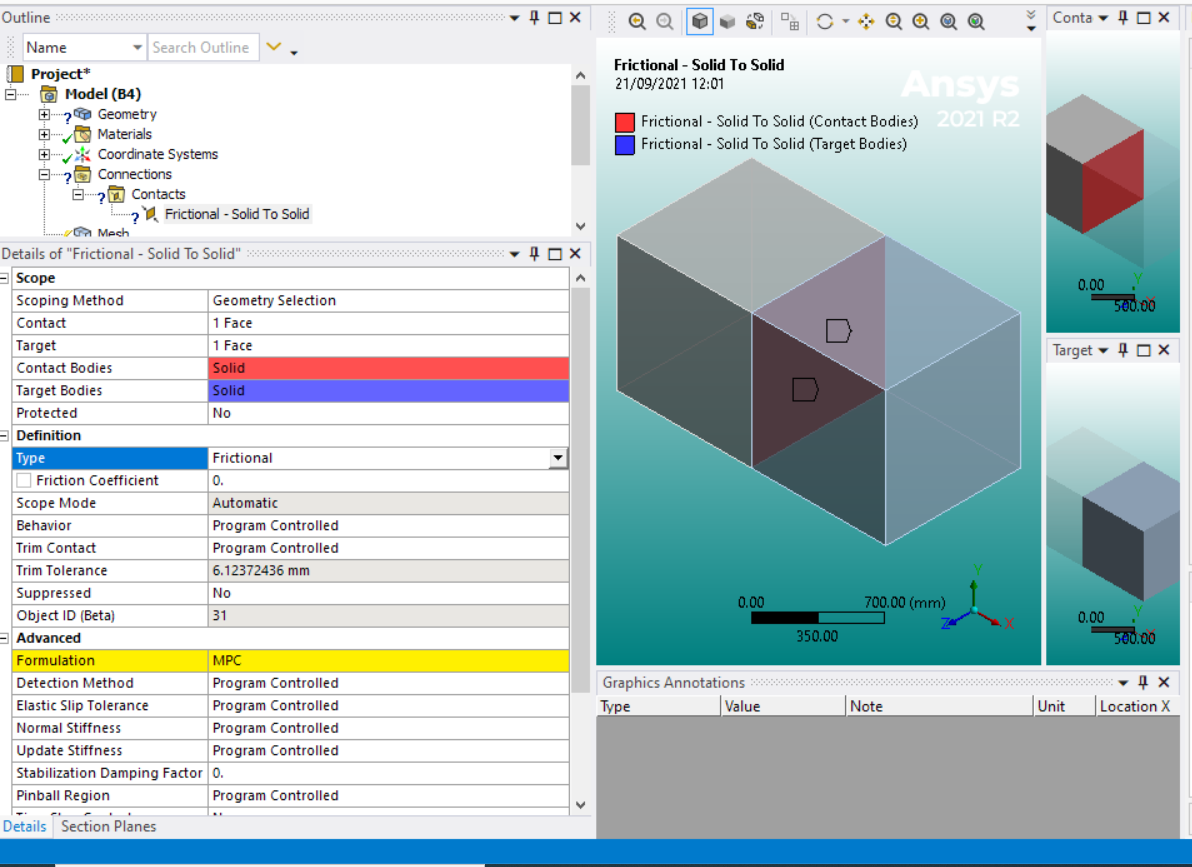TAGGED: contacts, penetration
-
-
September 18, 2021 at 6:17 pm
Rameez_ul_Haq
SubscriberCould anyone explain what would be the purpose of using MPC or Normal Lagrange formulation in non-linear contacts (frictional/frictionaless/rough) since these non-linear contacts themselves by nature requires convergence which basically is a function of if the penetration between the contacting faces is within the tolerance limit or not. If we use the formulation to MPC or Normal Lagrange, then there won't be any penetration between the target and contact faces. Then how would the solver detect convergence in these non-linear contact?
September 20, 2021 at 11:00 amRameez_ul_Haq
Subscriber,if you could provide your views on this one, we would be glad :)
September 20, 2021 at 12:06 pmpeteroznewman
SubscriberI only use MPC in Bonded Contact, so I have nothing to say about using MPC formulation in Frictional Contact, but you can read this section of Ansys Help to learn more about MPC contact.
https://ansyshelp.ansys.com/account/secured?returnurl=/Views/Secured/corp/v212/en/ans_ctec/Hlp_ctec_surfcon.html
Don't use MPC contact between RIgid Bodies. See this info in the Ansys Help:
https://ansyshelp.ansys.com/account/secured?returnurl=/Views/Secured/corp/v212/en/ans_ctec/ctecrigidbodies.html
Normal Lagrange uses the Lagrange Multiplier method.
https://ansyshelp.ansys.com/account/secured?returnurl=/Views/Secured/corp/v212/en/ans_thry/thy_geo6.html
Now, instead of just the deformation of nodes being the unknowns in the matrix equation, there are a number of Lagrange multipliers included in the matrix equation, which now includes a constraint that the penetration must be exactly zero. The solver iterates on the value of the Lagrange multipliers that enforce the zero penetration. This is completely different to the Penalty-based method you know about that has a Normal Stiffness to multiply with the Penetration to compute a contact Force and iterates on nodal position alone to find equlibrium.
Program Controlled frictional contact uses the augmented Lagrange Penalty-based method. Read about the pros and cons of each in this section of the help.
https://ansyshelp.ansys.com/account/secured?returnurl=/Views/Secured/corp/v212/en/ans_elem/Hlp_E_MPC184.html
September 20, 2021 at 2:52 pmRameez_ul_Haq
Subscriber,can you kindly tell the section numbers of these topics in ANSYS Help? I couldn't access the Ansys Help online but I have a document within my PC.
September 20, 2021 at 8:46 pmpeteroznewman
SubscriberDo you mean your computer does not have access to the internet?
September 21, 2021 at 7:46 amRameez_ul_Haq
Subscriber,I mean yes, my Work computer doesn't have access to the internet. But still I can access the internet on some specified computers. Plus, I don't have an account on the ANSY Help online since I am using ANSYS software bought by the company I work for. However, I have an offline document for ANSYS Help on my Work computer. So I can see what you referred to if I know the section numbers.
September 21, 2021 at 8:14 amErKo
Ansys EmployeeIf you follow the 3 steps outlined in the discussion below (link), then you will be able to access it:
Thank you
Erik
September 21, 2021 at 8:53 amRameez_ul_Haq
Subscriber,let me check out what you shared. Thank you. But still since I don't have accessiblity to internet on my work computer, I would have to find a computer which has internet and ANSYS available on itAnd also, if you have any information if using MPC for a non-linear contact could prove to be beneficial and in which cases, I would be glad :)
,ohh yes thats why we don't see normal stiffness option under advanced settings in 'Normal Lagrange' formulation since it doesn't have any penetration between the contact and target nodes. But MPC doesn't have penetration as well, rather the contact be linear or non-linear, but we see a normal stiffness value there. What is it for?
Plus, could you also please tell me that can't I retrieve forces at contacts if the formulation is set to those methods which has zero penetration? Since you mentioned that the penetration is multiplied with the normal stiffness to get the contact force.
September 21, 2021 at 11:03 amErKo
Ansys Employee
MPC can only be used with no separation, and bonded type - so there are no examples on what you are asking for since we can not use it say with a frictional/frictionless/rough (nonlinear) contact. Below is a screenshot from the mechanical users guide, contacts, and advanced settings, and formulation:

(See below - when choosing contacts such as frictional, rough, or frictionless (nonlinear types), then MPC formulation (in yellow) is not a valid option)
 For more info look for the mechanical users guide, object reference, contact region, object properties - most structural analyses, and formulation. Finally we do have a nice course in contacts which I would like to recommend .
For more info look for the mechanical users guide, object reference, contact region, object properties - most structural analyses, and formulation. Finally we do have a nice course in contacts which I would like to recommend .
All the best
Erik
September 21, 2021 at 2:38 pmRameez_ul_Haq
Subscriberthank you Erik. It was nice getting a reply from you after a long time :)
Viewing 9 reply threads- The topic ‘Are Non-linear contacts still Non-linear when formulation is set to MPC or Normal largrange?’ is closed to new replies.
Innovation SpaceTrending discussionsTop Contributors-
4678
-
1565
-
1386
-
1242
-
1021
Top Rated Tags© 2025 Copyright ANSYS, Inc. All rights reserved.
Ansys does not support the usage of unauthorized Ansys software. Please visit www.ansys.com to obtain an official distribution.
-











